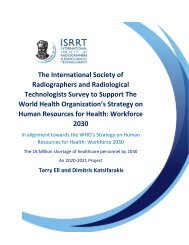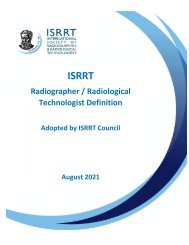2021_Book_TextbookOfPatientSafetyAndClin
Create successful ePaper yourself
Turn your PDF publications into a flip-book with our unique Google optimized e-Paper software.
27 Complexity Science as a Frame for Understanding the Management and Delivery of High Quality…<br />
389<br />
richness and nuanced cultures. It invited us to<br />
consider the characteristics of the agents and<br />
stakeholder groups who manoeuvre, negotiate,<br />
trade-off and navigate their settings. These are<br />
the features of healthcare that anyone interested<br />
in researching, leading or delivering high quality<br />
care, or managing clinical risk, must factor into<br />
their thinking and practices.<br />
27.8 Recommendations<br />
1. Sensitise those with responsibility for leading,<br />
managing, improving or researching care settings<br />
to a systems view.<br />
2. Train sufficient staff in the tools of complexity:<br />
FRAM, network analyses, system dynamics<br />
modelling, process mapping, and the like.<br />
3. Approach quality and safety and risk management<br />
activities with a knowledge of complexity<br />
science, sense-making, and non-linearity<br />
rather than as a set of linear problems amenable<br />
to simplistic causal change logic.<br />
4. Consider how our studies, borrowing from<br />
complexity theory, have resisted simplifying<br />
the challenges, but have nevertheless made<br />
progress in understanding care systems and<br />
their improvement.<br />
References<br />
1. Greenhalgh T, Papoutsi C. Studying complexity in<br />
health services research: desperately seeking an overdue<br />
paradigm shift. BMC Med. 2018;16:95.<br />
2. Plsek PE, Greenhalgh T. The challenge of complexity<br />
in health care. BMJ. 2001;323:625.<br />
3. Provost SM, Lanham HJ, Leykum LK, McDaniel RR<br />
Jr, Pugh J. Health care huddles: managing complexity<br />
to achieve high reliability. Health Care Manage Rev.<br />
2015;40:2–12.<br />
4. Lanham HJ, Leykum LK, Taylor BS, McCannon CJ,<br />
Lindberg C, Lester RT. How complexity science can<br />
inform scale-up and spread in health care: understanding<br />
the role of self-organization in variation across<br />
local contexts. Soc Sci Med. 2013;93:194–202.<br />
5. Petticrew M. When are complex interventions ‘complex’?<br />
When are simple interventions ‘simple’? Eur J<br />
Pub Health. 2011;21:397–8.<br />
6. Hawe P. Lessons from complex interventions<br />
to improve health. Annu Rev Public Health.<br />
2015;36:307–23.<br />
7. Hawe P, Shiell A, Riley T. Complex interventions:<br />
how “out of control” can a randomised controlled trial<br />
be? BMJ. 2004;328:1561.<br />
8. Braithwaite J, Clay-Williams R, Nugus P, Plumb<br />
J. Health care as a complex adaptive system. In:<br />
Hollnagel E, Braithwaite J, Wears RL, editors.<br />
Resilient health care. Surrey, UK: Ashgate Publishing;<br />
2013. p. 57–73.<br />
9. Anderson RA, Issel LM, McDaniel RR Jr. Nursing<br />
homes as complex adaptive systems: relationship<br />
between management practice and resident outcomes.<br />
Nurs Res. 2003;52:12–21.<br />
10. Anderson RA, Corazzini KN, McDaniel RR Jr.<br />
Complexity science and the dynamics of climate and<br />
communication: reducing nursing home turnover.<br />
Gerontologist. 2004;44:378–88.<br />
11. Miller WL, McDaniel RR, Crabtree BF, Stange<br />
KC. Practice jazz: understanding variation in family<br />
practices using complexity science. J Fam Pract.<br />
2001;50:872–8.<br />
12. McDaniel RR, Dean JD. Complexity science and<br />
health care management. In: Friedman LH, Goes J,<br />
Savage GT, editors. Advances in health care management,<br />
vol. 2. Bingley, UK: Emerald Group Publishing<br />
Limited; 2001. p. 11–36.<br />
13. Cunningham FC, Ranmuthugala G, Westbrook JI,<br />
Braithwaite J. Tackling the wicked problem of health<br />
networks: the design of an evaluation framework.<br />
BMJ Open. 2019;9:e024231.<br />
14. Braithwaite J, Churruca K, Ellis LA, Long JC, Clay-<br />
Williams R, Damen N, Herkes J, Pomare C, Ludlow<br />
K. Complexity science in healthcare – aspirations,<br />
approaches, applications and accomplishments: a<br />
white paper. Sydney: Australian Institute of Health<br />
Innovation, Macquarie University; 2017.<br />
15. Cohn S, Clinch M, Bunn C, Stronge P. Entangled<br />
complexity: why complex interventions are just<br />
not complicated enough. J Health Serv Res Policy.<br />
2013;18:40–3.<br />
16. Rychetnik L, Frommer M, Hawe P, Shiell<br />
A. Criteria for evaluating evidence on public<br />
health interventions. J Epidemiol Commun Health.<br />
2002;56:119.<br />
17. Craig P, Dieppe P, Macintyre S, Michie S, Nazareth<br />
I, Petticrew M. Developing and evaluating complex<br />
interventions: the new Medical Research Council<br />
guidance. BMJ. 2008;337:a1655.<br />
18. Datta J, Petticrew M. Challenges to evaluating complex<br />
interventions: a content analysis of published<br />
papers. BMC Public Health. 2013;13:568.<br />
19. Braithwaite J, Churruca K, Ellis LA. Can we fix<br />
the uber-complexities of healthcare? J R Soc Med.<br />
2017;110:392–4.<br />
20. Rittel HWJ, Webber MM. Dilemmas in a general theory<br />
of planning. Policy Sci. 1973;4:155–69.


















